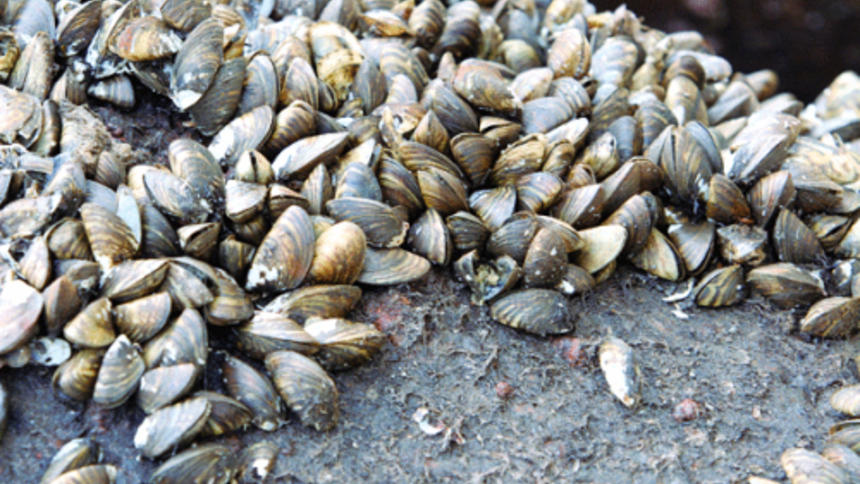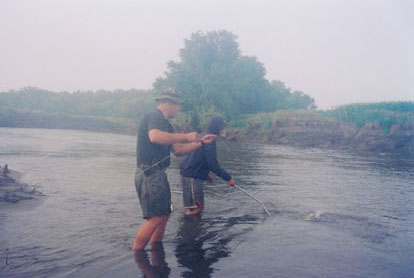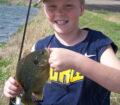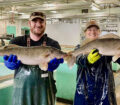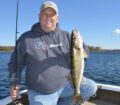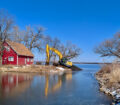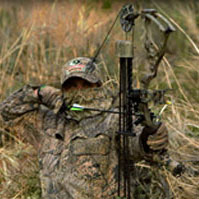By Steve Weisman
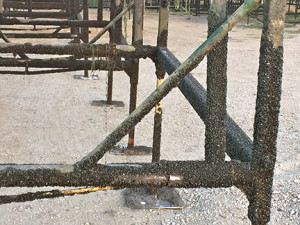
(photo by Steve Weisman)
Zebra mussels attached to all of these hoists recently taken from East Okoboji.
A few weeks ago, our greatest fear about the extent of the zebra mussel infestation on the Okoboji chain of lakes was realized when docks and hoists started to come out. I recently looked at a line of hoists, probably 30 or so, taken out of East Okoboji that had been placed on the shoreline. The entire bottom half of the hoists’ legs were totally covered with adult zebra mussels (see photo).
At this point, Big Spirit is the only lake where adult zebra mussels have not been discovered. We will only know if that holds true when all docks and hoists have been removed and none are found! If that happens, then we still have a chance to protect the lake from this invasive.
That is why we must, and I repeat MUST follow the law: It is illegal to possess or transport zebra mussels and other prohibited aquatic invasive species in Iowa. It is also illegal to transport any aquatic plants on water-related equipment. Boaters must drain all water from boats and equipment before leaving a water access and must keep drain plugs removed or opened during transport.
At the same time, the DNR has worked with Iowa Great Lakes service providers to help prevent the introduction of zebra mussels or other aquatic invasive species to additional waters. Providers were given a permit to transport water-related equipment that is or may be infested with zebra mussels and aquatic plants to an approved storage location via an approved route. All equipment removed must be allowed to dry a minimum of 10 days and all mussels and plant materials must be removed before being moved outside of the approved area.
The old adage, “It is what it is” best describes our situation right now, but we must move on from here. We need to remain diligent about trying to control the spread of zebra mussels to other waters. That’s the reason that Iowa and surrounding states now have the law about water in livewells, etc. We flat out need to do a better job of taking care of our resources. We are such a mobile society and go to so many waters across the country that we must keep working on stopping the spread of invasives.
Plus there are so many other invasives that could take up residence in our lakes. They can all be stopped by not transporting water and vegetation from one body of water to another. Of course, we have already dodged the attack of bighead and silver carp. They are one of the reasons why it is illegal to throw baitfish back in the water when we are done fishing. There are invasives out there knocking on the door:
- Spiny and Fishhook Waterfleas, small crustaceans that threaten aquatic ecosystems. Plus they foul fishing gear and collect in masses on fishing lines.
- White Perch, 5-7 inches long, can overpopulate and displace other fish. They have made their way to the tributaries of the Missouri River in southern Iowa.
- Round Goby, 3-6 inches long, can negatively impact native fish populations.
- Rusty Crayfish, very aggressive and often displaces native crayfish species.
- Aquatic invasive such as Brittle Naiad, Curlyleaf Pondweed, Eurasian Watermilfoil, Flowering Rush, Purple Loosestrife.
Yes, we have an uphill battle ahead, but we can’t just give up. We must fight and do a better job of it!
Now, back to zebra mussels and their impact on the Iowa Great Lakes…In visiting with Mike Hawkins, Spirit Lake District fisheries management biologist, we are really in uncharted waters when we talk about what this means in the future. We do know that if the normal pattern is followed, there will be a population explosion.
Zebra mussels are filter feeders and directly compete with native species, including mussels and small fish, for food. Zebra mussels also adhere to hard objects. If densities are high enough, they can smother native mussels by attaching to their shells. Studies have shown photos of scores of zebra mussels attached to a single native mussel! Drinking water utilities and the State Fish Hatchery are also impacted since zebra mussels could attach and grow on the inside of intake pipes, potentially clogging them.
Yes, they will filter the water causing the water to become much clearer. However, that does not mean that the water will be “cleaner.” What they have done is to filter out the algae, which is part of the food chain for native microscopic organisms. This will most likely increase the depth that we will find submergent vegetation. This will probably favor largemouth bass, northern pike and panfish like perch, bluegills, crappie and yellow bass. It might negatively impact the walleye population. On West Okoboji, this might mean weeds consistently out in depths up to, maybe, 40 feet.
On a lake like East Okoboji, this might be more native vegetation occurring and potentially curly leaf pondweed expanding into more of the lake.
There is the possibility that after the initial zebra mussel population explosion, it might settle back a bit as the system tries to find a balance for everything to fit in some way or another.
All the while, we cannot give up. Researchers are working every day trying to find an answer to limit the impact of zebra mussels. From what I have read, none of them think they will ever be totally eliminated. However, there is hope, though it may be years down the road, that there can be an answer.

